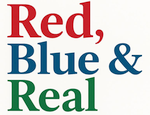Rebuilding the Middle Class, Restoring Democracy
There’s a difference between simply getting by—and truly belonging to a country that values your life.
At its strongest, America thrived because the middle class thrived. The most stable, productive, and hopeful periods in our history were built on the idea that ordinary people could build secure lives through hard work, fairness, and mutual investment in the common good. A decent home, school for the kids, a modest vacation, and a dignified retirement—this wasn’t a fantasy, or a reward for the lucky few. It was a shared vision. And for a time, it worked.
The Unraveling
But that vision has been systematically unraveled.
Over the past 45 years, the stability and fairness that defined middle-class life have been quietly stripped away—not by accident, but by deliberate exploitation. Wages stagnated. Costs rose. Unions were weakened. Public goods were sold off—sometimes to save money, but often to enrich a few. Public services became profit centers instead of public goods.
In theory, privatization can be useful. But in practice, when it’s driven by greed instead of public interest, it drains resources from the many to benefit the few.
Through it all, slogans helped mask the damage: “efficiency” (often just code for cuts), “freedom” (redefined as freedom from responsibility to each other), and “trickle-down” (which never actually did).
A Deliberate Strategy
What happened wasn’t some drift of history. It was a strategic transfer of wealth and power, engineered by people who saw middle-class security as an obstacle—not a goal. A stronger, more inclusive future wasn’t the goal—only what could be taken in the short term. The middle class became a market to exploit and a voting bloc to manipulate.
Now, we live with the fallout. Our economy is top-heavy and fragile. Our politics are flooded with resentment, rage, and fear. People are working harder than ever just to stay afloat. Young adults can’t afford to buy homes—or even rent them. Families are living in cars. And the hope that once defined the American spirit is dissolving into exhaustion and quiet despair.
This didn’t just damage people’s lives. It fractured the foundation of our democracy.
“Middle-class security wasn’t a side effect of democracy. It was the engine that made it work.”
Democracy on the Line
A functioning democracy depends on a strong middle class—on people who feel they have a stake in the system. Who believe their voices count. Who see a future for themselves and their children.
When that sense of connection—to the system, to their country, and to each other—starts to erode, we get disengagement, division, and desperation. People lose faith—and when they do, some turn to chaos, some to strongmen, and some to silence.
It’s Not Too Late
The American middle class can still save this country—if we work for it. That means fair wages. Public services that work. Affordable housing, healthcare, and education. Support for families and workers. And a government that sees people not as consumers or donors—but as valued citizens.
A revitalized middle class means more than economic comfort. It means young people can imagine a future without fear of debt. It means teachers, nurses, and service workers can live in the communities they serve. It means fewer families on the edge—and more people building stable lives with room to breathe.
It means we begin to reconnect—to our neighbors, our communities, and even across political lines. Not because we suddenly agree on everything, but because we once again have something real in common: a stake in the future.
It means restoring conversations around kitchen tables instead of severing the bonds that hold us together. It means the return of trust—not blind, but earned, slowly, through shared progress.
What Renewal Looks Like
A restored middle class brings with it a more stable, generous, and less suspicious country. A culture that values fairness over fear. That builds instead of hoards. That supports instead of scapegoats.
It means a political system that actually reflects the will of the people, because more people can afford to participate and hold leaders accountable. It means less division, because when people feel secure, they don’t need someone to blame. And it means renewed faith—in each other, and in the idea that America can still live up to its promise.
The Path Forward
Rebuilding the middle class isn’t some temporary patch or economic fix. It’s how we will restore democracy. It’s how we build a future that includes all of us—morally, socially, and politically.
